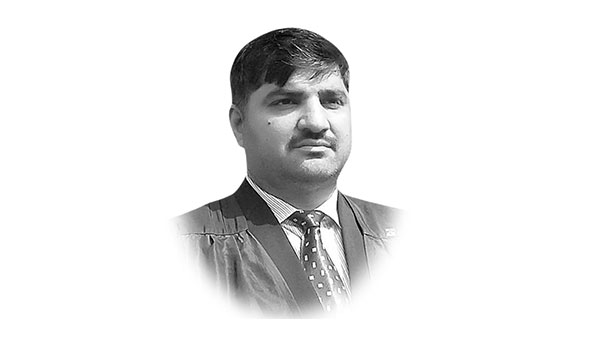Political parties cynical approach towards military
DEFENCE forces – Army, Air Force and Navy – have constitutional status and constitutional protection against criticism like Superior Judiciary – which cannot be criticised publically – and like Parliamentarians who enjoy immunity.
Ironically, the writers, politicians and intelligentsia as hire-guns of foreign forces, especially India, Israel and America are relentlessly engaged to demoralise, defame, de-popularise, politicise and to tarnish the image of Pakistan army and its intelligence agencies through their controlled print and electronic media (including social media).
In this age of cyber and hybrid warfare, they also succeeded to hire the services of academia, intelligentsia and political leaders in Pakistan to target their own army and security forces despite their services to restore peace in the terrorism and militancy-hit areas of Pakistan.
In the post-2018 general election, Pakistan army was targeted by the political parties that lost elections; and tried to hold responsible the military establishment for the success of Pakistan Tehreek-e-Insaf.
The opposition parties also tried to make controversial the appointments of the Chief of Army Staff.
It is pertinent to point out that President of Pakistan as Supreme Commander of the Defence Forces appoints Chief of the Forces on the advice of the Prime Minister of Pakistan being Chief Executive of the country under Article 243 (4) of 1973 Constitution of Pakistan.
Unfortunately, such unpleasant trend has trickle down effects in the society and on the young generation.
Some instances regarding the appointments of Army Chiefs need to be highlighted. Pakistan Muslim League (Nawaz) is one of the major political parties of Pakistan which got the opportunity to rule the country four times and Punjab as well.
PML (N) and Pakistan People’s Party have always remained rival political forces; and during 1988-1999 none of these political parties could complete their respective constitutional term due to their ceaseless confrontational policies based upon victimization, character assassination and other foul plays.
In addition, PML (N) also opened front against military leadership from time to time. First, On January 12, 1993, former Prime Minister Nawaz Sharif appointed General Abdul Wahid Kakar as Chief of the Army Staff (COAS) who remained in office January 12, 1996 by superseding four senior Lieutenant Generals – Reham Dil Bhatti, Mohammad Ashraf, Farrakh Khan and Arif Bangash – while appointing General Kakar as COAS.
Second, Prime Minister Nawaz Sharif created differences with the then CoAS General Jehangir Karamat which resulted into the resignation of General Karamat.
Then Prime Minister Nawaz Sharif appointed General Pervez Musharraf as the COAS on October 6, 1998 while superseding his seniors Lt Gen Ali Quli Khan and Lt Gen Khalid Nawaz Khan.
He also created differences with General Musharraf which led to collapse of his government in October 1999; and later on Nawaz Sharif was sent on exile on his alleged involvement in Plan conspiracy.
Third, Mian Nawaz Sharif appointed Lt Gen Raheel Sharif as the 15th Chief of the Army Staff and Lt Gen Rashad Mahmood as the new CJCSC in November 2013 by superseding their senior most Lt General Aslam Haroon who later resigned.
Lastly, Mian Nawaz Sharif appointed Gen Qamar Javed Bajwa as CoAS and superseded Lt Gen Syed Wajid Hussain (Chairman of Heavy Industries Taxila), Lt Gen Najibullah Khan (DG Joint Staff Headquarters), Lt Gen Ishfaq Nadeem Ahmed (Corps Commander Multan) and Lt Gen Javed Iqbal Ramday (Corps Commander Bahawalpur) in November 2016.
In addition to this, Pakistan People’s Party and PTI also made appointments in defence forces during their respective regimes.
General Bajwa and Gen Faiz Hameed are subjected to undue criticism by political parties and their workers which is highly deplorable.
Lt Gen Faiz Hameed’s strategic planning and professionalism with regard to Afghanistan is highly remarkable.
His role as Chief of Inter-Service Intelligence – Pakistan’s spy agency – in Afghanistan’s affairs and peace building in Afghanistan and merged areas of Pakistan.
General Faiz also took initiatives in infrastructural building of merged areas – the former hub of militants – and terrorism hit areas and people.
He is also interacting with his people especially students in academia to answer various questions generously regarding militancy, terrorism, and Paki army’s role in countering Post 9/11 terrorism and militancy wave in Pakistan and in the region.
It is a matter of high concern that political parties are targeting the military leadership despite their innumerable sacrifices.
The present government must take action against such elements across the board. It is the time that politicians cease to stop unnecessary attacks on defence forces – our national and constitutional institution – for their political gains and scoring.
—The writer is Editor of Journal of Political & Security Studies, ICP & Member of Editorial Board of Journal of Wallacea, University of Western Australia.










